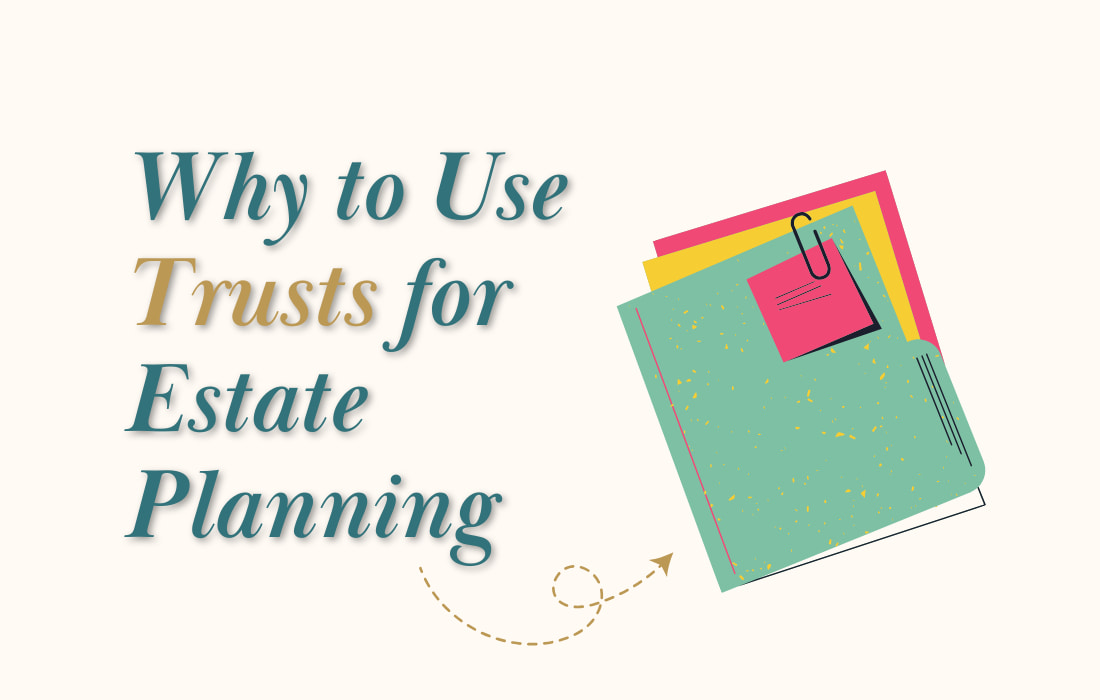Should I Use a Trust for My Estate Planning?
Trusts are a valuable tool for effective estate planning in Canada and the US because they allow you more control over the distribution of your assets. But not everyone needs a trust. Find out who needs a trust and why to use a trust for estate planning.
Written By Tiffany Woodfield, Financial Coach, TEP®, CRPC®, CIM®

Trusts can help ensure that beneficiaries (aka the people you love) receive their inheritance as intended.
They can also help make wealth transfer smoother by avoiding the lengthy probate process, offering privacy and asset protection, and minimizing estate taxes.
But before we get started, here is a word of caution. Not all trusts work the same way, and to ensure they work as you intended, you should get legal advice when setting up a trust. For more on when to use a trust for estate planning, read this post.
What is a trust?
A trust is a legal arrangement in which an individual, the trustor, transfers ownership of their assets to a trustee, who manages those assets according to the terms outlined in the trust deed. This contract ensures that the assets are managed and distributed according to the trustor’s wishes during their lifetime and beyond.
How does a trust work in estate planning?
Many people use trusts to avoid probate when they pass away.
Assets held in a trust are not part of your estate and, therefore, aren’t subject to probate upon your death. Assets held in the trust can be distributed more quickly than if they were to go through the probate process.

How can a trust help protect my assets?
Trust assets can be protected from lawsuits, creditors, and divorce claims if structured properly.
In addition, when creating a trust, you can clearly outline your intentions regarding the assets and the rules for when and how they can be distributed. For example, children can be beneficiaries without actual control of the asset.
What are the tax benefits of using a trust for estate planning?
CANADA
In Canada, normally, death is a major taxable event because when an individual passes away, there is a major deemed disposition.
It is as if you sold all your assets right before you died, and taxes become due on any capital gains.
However, when a family trust owns the assets, the death of an individual does not create a tax liability for the assets held in the family trust because the individual does not have ownership.
Thus, the estate’s final tax liability may be considerably reduced.
A trust can also allow multiple beneficiaries to take advantage of the Lifetime Capital Gains Exemption (LCGE)
USA
Using trusts for estate planning in the US can offer significant tax benefits, such as reducing estate taxes by removing assets from your taxable estate.
Certain types of trusts, like irrevocable life insurance trusts, aka ILIT, can help shield life insurance proceeds from estate taxes. Trusts can also facilitate the efficient transfer of wealth to heirs while minimizing potential gift and generation-skipping taxes.

Can a trust help my family avoid probate?
If a trust is set up properly, the assets in the trust do not go through probate and can be distributed according to the trust deed.
What’s the difference between a revocable and an irrevocable trust?
A revocable trust allows the trustor to keep control over the assets, including to be able to modify or revoke the trust.
In contrast, an irrevocable trust cannot be altered once established and provides greater protection from creditors and potential tax benefits.
Can a trust help me protect my family’s financial future?
A trust can protect your family’s financial future by reducing your tax burden and providing opportunities to transfer your wealth while still having protection in place.
For example, Bruce has three children and two grandchildren.
He loves all his kids equally, but they are at very different stages of life. One is married, the other is separated, and the third is a spendthrift.
He wants to treat all his kids equally and doesn’t want their inheritance to be spent recklessly or lost in a divorce settlement.
By setting up a trust and having a qualified trustee, he can transfer the assets during his lifetime and have clear parameters for when and how the money will be distributed to the kids as beneficiaries.
Are trusts only for ultra-wealthy individuals, or can anyone benefit from using one?
A trust is not a one-size-fits-all thing.
Although wealthy individuals have more wealth to protect, there are many reasons people of various income and asset levels can benefit from a trust.
Some uses for trusts are:
- To transfer your wealth tax efficiently.
- To protect a child who has a disability or is a minor.
- To keep an estate confidential.
- To help avoid conflict and ensure the assets go where you intended in the case of a blended or large family.
- For greater flexibility in planning, such as when you have a family business and want to distribute your assets evenly to family members working in and outside the business.
- For more customization and restriction options, with estate planning, such as if you want your second spouse to remain in your primary residence, and when they pass, it goes to the named beneficiary(s) and doesn’t form part of the spouse’s estate.
Who should seriously consider getting a trust?
You should seriously consider getting a trust if you:
- Have a child with special needs because there are tax benefits, and you will want to know they are protected when you are no longer around.
- Have a complicated estate with assets and beneficiaries in multiple countries.
- Have a blended family and want to prevent conflicts.
- Have a business with some family members as part of the business, and others not.
- Need creditor protection or are worried about potential lawsuits.

Final Thoughts
Trusts are a powerful and versatile tool for estate planning. They offer control, privacy, tax efficiency, and asset protection.
Whether you want to simplify wealth transfer, support loved ones with special needs, or avoid probate complications, trusts can help achieve your goals. However, not all trusts are the same, and proper setup is essential to ensure your wishes are met. By working with experienced legal and financial professionals, you can tailor a trust to fit your unique needs and protect your family’s future.
Get the Free Guide and Audio Meditation for Manifesting Your Dreams
Pop your email address in the form below to get my easy checklist and guide to manifesting and the guided audio meditation to help you get started.
You’ll also get one or two emails per month with the latest blog posts about abundance, wealth-building, manifesting, and creating a fulfilling life.
Related Articles
💎 When to Use a Trust for Estate Planning
💎 Why Is Generational Wealth Important?
💎 How to Establish Generational Wealth
💎 What to Bring to an Estate Planning Appointment
💎 At What Age Should I Consider Estate Planning?
About the Author

TIFFANY WOODFIELD is a financial coach, cross-border expert, and the co-founder of SWAN Wealth based out of Kelowna, BC. As a TEP and associate portfolio manager, Tiffany has extensive experience working with successful professionals who want to leave a legacy and enjoy an adventurous, work-optional lifestyle. Tiffany combines extensive knowledge from her background as a financial professional with coaching and her passion for personal development to help her clients create a unique path that allows them to live their fullest potential. Tiffany has been a regular contributor to Bloomberg TV and has been interviewed by national and international publications, including the Globe and Mail and Barron’s.